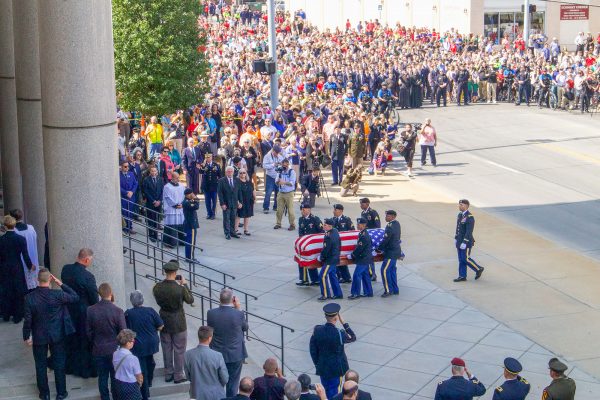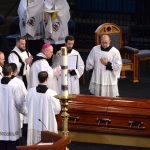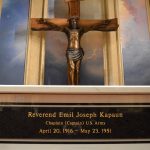Bishop Kemme: Fr. Kapaun conformed his life to Christ

Fr. Kapaun’s body is carried by a military honor guard into the Cathedral of the Immaculate Conception in Wichita. (Advance photo)
Fr. Emil J. Kapaun conformed his life to Christ, Bishop Carl A. Kemme said at a funeral Wednesday, Sept. 29, about the Korean War hero.
“Jesus modeled that love for us on the cross. He gave his life for us, his friends, so that we might not perish but might have eternal life,” Bishop Kemme said. “Father Kapaun imitated that love all throughout his ministry but it reached its fulfillment on May 23, 1951, the day of his personal Calvary, in a dark and lonely place, giving all he had for others.”
A Mass of Christian Burial was celebrated for Fr. Kapaun, a native of Pilsen, Kansas, in Hartman Arena in Park City, Kansas. Over 5,000 attended the event that was live-streamed by EWTN and several other outlets.
Servant of God Fr. Kapaun under consideration by the Vatican’s Congregation for the Causes of Saints.

Bishop Carl A. Kemme blessed the body of Fr. Emil Kapaun Wednesday, Sept. 29, 2021, during a funeral in Hartman Arena in Park City, Kansas.
Father Kapaun captured in 1950
The priest of the Diocese of Wichita, a W.W. II and Korean War U.S. Army chaplain, was captured with many other soldiers on Nov. 1, 1950. He died at age 35 on May 23, 1951, after being forcibly taken to a North Korean prisoner of war hut to die.
“Don’t worry about me,” he told fellow prisoners. “I’m going where I always wanted to go, and when I get there, I’ll say a prayer for all of you.”
Bishop Kemme said Fr. Kapaun’s imitation of Christ began long before that day.
“Father’s earthly life began and was lived in a quiet, almost hidden way, but in a way that attracted the attention of family, priests, parishioners, and others,” he said. “Something was special about young Emil Joseph Kapaun. In so many ways, he was like his middle name’s sake, Joseph, he was humble, obedient, virtuous, simple, and hardworking.”
No one was surprised when he announced he wanted to become a priest, Bishop Kemme said. Young Emil Kapaun made an almost daily, three-mile trip to St. John Nepomucene Church in Pilsen to serve Mass. He was ordained in 1940.
Offered his life to Christ
“Like all priests, he offered his life in obedience to the bishop in whatever form of service he would be called to give, but he heard in the quiet recesses of his heart a call within a call, the call to give of himself as a chaplain in the armed forces.”
Thus began a life of sacrificial and selfless love of others, especially his beloved fellow soldiers, whom he regarded as brothers, even sons, the bishop said.
“The accounts of his service to his fellow soldiers and in the last months to his fellow POW’s reveal so much of the man whose body we honor today with Christian burial. His love was simple, effective, selfless, and deep.”
He strived to lift the spirits of his fellow prisoners, Bishop Kemme said.
“He would lead them in prayer, tell a joke, sing a song, pick lice of their bodies, boil water to give them a drink of clean water to ward off dysentery, give them some meager amounts of food he had somehow managed to get – even by stealing. In short, to do whatever he could to bring light to those who entered into a darkness few of us can imagine. He was a missionary disciple of hope – and that hope indubitably kept many of those men alive.”
Fr. Kapaun trip begins in Hawaii
Bishop Kemme was among the entourage from the diocese that traveled the previous week to Hawaii to claim the remains of Fr. Kapaun at a military facility dedicated to identifying the remains of fallen soldiers.
He said he was astonished when Ray Kapaun, Fr. Kapaun’s nephew, asked if the bishop would like to touch the chaplain’s skull.
“I was stunned by the invitation and after a moment expressed my deep desire to do so,” he said. “As each of us reverently touched this relic of the man…many thoughts began to enter my mind. The skull is the physical foundation of so much of what makes us human, the face, the eyes, the ears, the mouth.”
Bishop Kemme said while doing so he thought of Fr. Kapaun’s face that is seen in so many photos, a caring face of quiet strength, a face of character, a face of a friend, a comrade, a brother that instilled courage and confidence.
“Those who were so blessed to look into his eyes I am confident saw a reflection of Jesus, to whom Father Emil had dedicated his life,” he said. “And I thought of his lips and mouth that spoke words that lifted spirits and gave strength and courage, that gave absolution and freedom.
“It was in those places too that Father was baptized on his foreheard, anointed on the crown of his head as priest, prophet, and king and ordained as a priest of Jesus Christ by the imposition of hands.”
Several bishops from the Midwest and the Most Rev. Richard Spencer, bishop of the Archdiocese of Military Services, attended the funeral along with nearly all of the priests and seminarians of the Diocese of Wichita.
Military caisson
The day ended after Fr. Kapaun’s remains were loaded onto a U.S. Army funeral caisson, a two-wheel, horse-drawn cart originally used to transport the wounded or dead from the battlefield. The procession began at Veteran’s Memorial Park, about a half-mile west of the Cathedral of the Immaculate Conception in downtown Wichita.
The caisson was led by a military color guard and was followed by Bishop Kemme, Kapaun family members, and other military personnel. An estimated 3,000 people made up of Catholic school students, their families, and others lined the streets as the horse-drawn cart passed.
A 21-gun salute was fired in front of the Cathedral after an honor guard carried Fr. Kapaun’s body up the steps of the cathedral.

The tomb of Fr. Emil Kapaun is housed in the Cathedral of the Immaculate Conception in Wichita, Kansas.
Fr. Kapaun’s casket was placed in a marble tomb located beneath a large crucifix in the east transept of the cathedral. Before the tomb was covered with a nameplate, diocesan priests, family members, and friends were allowed to touch the coffin and offer a prayer.
A flight from Dallas that originated in Honolulu landed in Wichita’s Eisenhower National Airport Saturday, Sept. 25, with Fr. Kapaun’s remains. They were then taken as part of a procession to his hometown church in Pilsen for public and private services.
A vespers with the clergy of the diocese was held Monday, Sept. 27, in the cathedral in Wichita. A funeral vigil was held on Tuesday in Hartman Arena.
